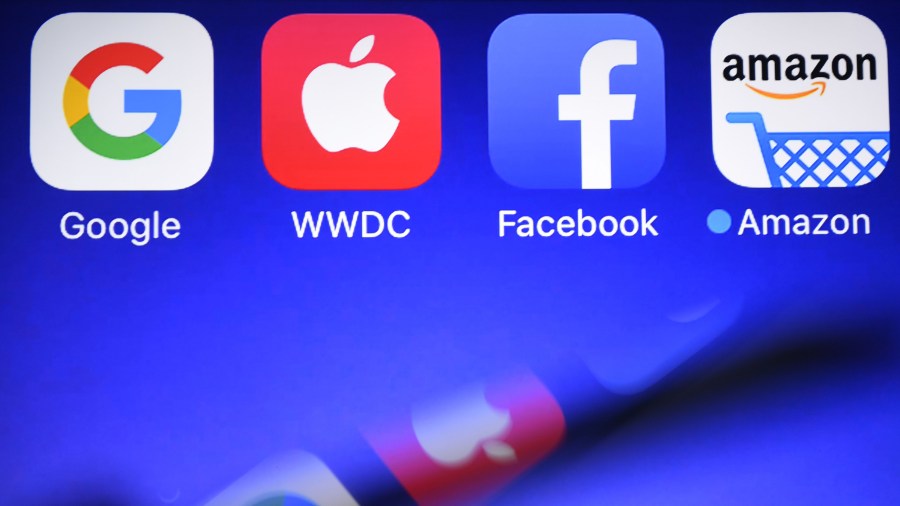The U.S. is talking, and the EU is regulating. Is any of it slowing down Big Tech?

This Friday’s “Quality Assurance” segment takes a deeper look at the different approaches the United States and European Union are taking to regulate Big Tech.
This week’s congressional hearings on Big Tech covered everything from free speech to competition, privacy and bitcoin. They suggested that U.S. lawmakers might be moving closer to some regulation to curb Facebook, Google, Amazon and Apple. Meanwhile, Europe is way past the talking stage. Its big privacy law, the General Data Protection Regulation, is legislating data collection by U.S. companies.
Just this week, the EU launched a new antitrust investigation into Amazon and fined Qualcomm for predatory pricing. Host Molly Wood spoke about tech company regulation in the EU versus Washington, D.C., with Mark Scott, who’s chief technology correspondent with Politico. The following is an edited transcript of their conversation.
Mark Scott: I think D.C. right now is playing a game of catch-up. We have gone in the last 18 months from D.C. lawmakers frankly doing nothing and saying everything is fine to this week multiple hearings on the Hill and a day of reckoning for Big Tech. From that perspective, they are moving pretty quickly. It’s just the Europeans have been doing this for decades.
Molly Wood: The Europeans have been doing this for decades. Do you think it’s been effective? Here we still are with these companies just as big.
Scott: The short answer is no, it’s not. But that does not mean multibillion-dollar fines don’t have a role to play. The way the Europeans have messed up — and I’m hoping the Americans will learn from this — is it’s not about the fines. When Facebook finally gets its $5 billion [Federal Trade Commission] fine, everyone gets that Big Tech and investors won’t care. What will really matter is if the FTC lawmakers on the Hill and the Europeans take a meaningful look at how these companies operate and force meaningful changes in how they make money from people like you and me.
Wood: What do you think are the odds of that happening, either from Europe or the U.S.?
Google, Facebook, Apple [and] Amazon know their businesses better than regulators, many of whom do not have a tech background.
Mark Scott
Scott: In the short term, I cannot be the pessimist, but I think that’s also not going to happen purely because regulators and lawmakers aren’t set up for that. They are more willing to get the headline billion-dollar fine and move on. What it really takes is an ongoing, meaningful, lasting deep-dive into these business models. And frankly, Google, Facebook, Apple [and] Amazon know their businesses better than regulators, many of whom do not have a tech background. On the Hill this week, we saw many struggle to really grasp what is going on.
Wood: What about consumer behavior? Ultimately, is it possible that this could come down to competition and consumer behavior driving more change than regulators can?
Scott: This is the one thing that no one wants to talk about — the fact that we all love Facebook. We all use Google. I have an Amazon Prime account. The issue is, frankly, on both sides of the Atlantic, most people still prefer tech companies — even Facebook — to lawmakers. Therefore, when it comes to trust, there is an issue of limited contact with our politicians, and ahead of the 2020 election in the States, it just may become more toxic.
Related links: more insight from Molly Wood
I know we just finished talking about how we don’t think the government is going to take substantive steps toward regulation, but maybe hold that thought. The Washington Post reported Thursday that the Federal Trade Commission is considering revamping the Children’s Online Privacy Protection Act, which states that apps and websites can’t collect personal information about kids under the age of 13.
That’s why you’re supposed to be 13 years old to sign up for online services. But the FTC said kids are visiting all kinds of sites, like YouTube, and downloading all kinds of apps, like Instagram, Snapchat and Fortnite. It said it might need tougher enforcement or even new rules to deal with all that activity.
A bipartisan bill in the Senate would expand COPPA to cover kids as young as 5 years old. Maybe we’ll regulate after all — if it’s for the children.
The future of this podcast starts with you.
Every day, the “Marketplace Tech” team demystifies the digital economy with stories that explore more than just Big Tech. We’re committed to covering topics that matter to you and the world around us, diving deep into how technology intersects with climate change, inequity, and disinformation.
As part of a nonprofit newsroom, we’re counting on listeners like you to keep this public service paywall-free and available to all.
Support “Marketplace Tech” in any amount today and become a partner in our mission.



















